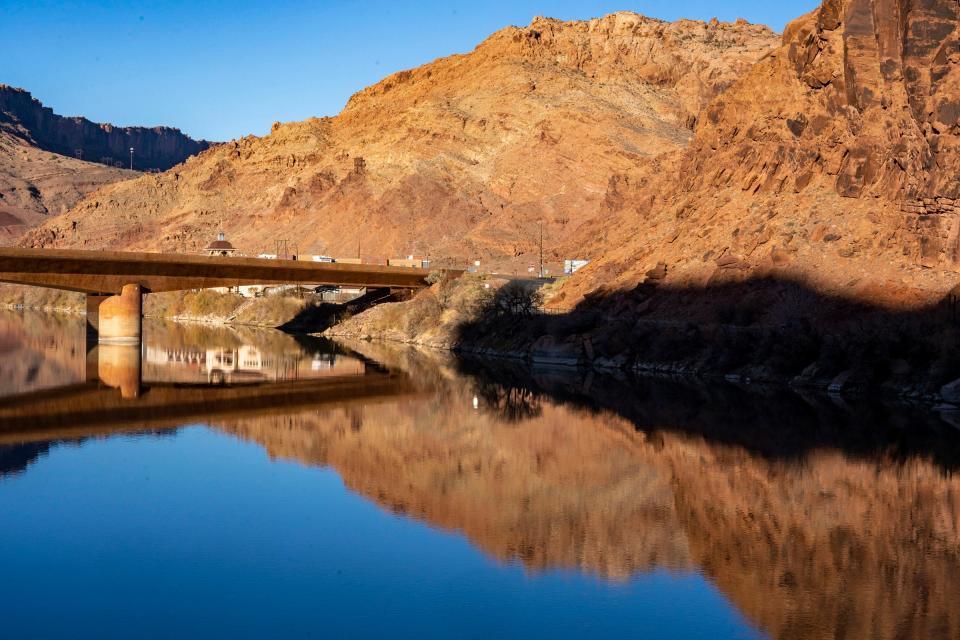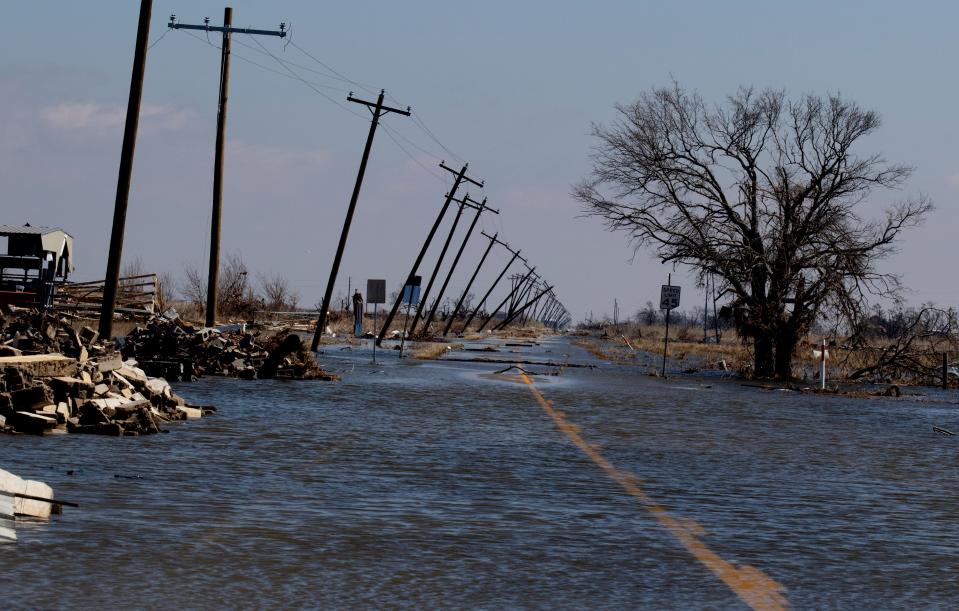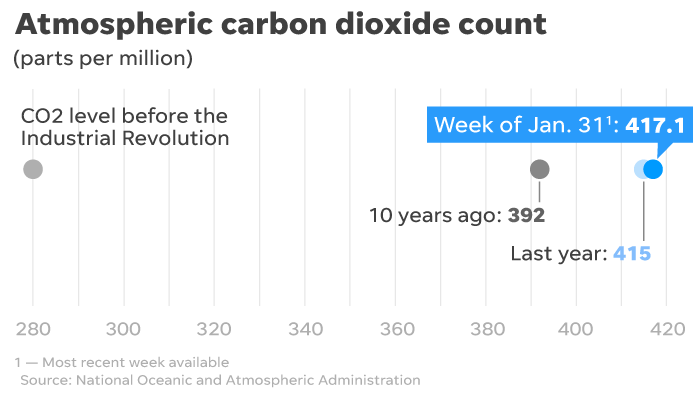Climate Point: COVID-fighting-crabs, energy scams and a race to the red planet
Welcome to Climate Point, your weekly guide to climate, energy and environment news from around the Golden State and the country. In Palm Springs, Calif., I’m Mark Olalde.
In this desert paradise where I live, spring is already in the air. Warming temperatures are melting away the winter cold (or, as cold as it ever gets in Palm Springs), and early blooming plants are bringing a renewed splash of color. That might be pleasant for you. For me — and for millions of other people — spring brings on the annual respiratory dance with the devil known as allergies. So, of course, climate change is about to make our allergies a whole lot worse. Doyle Rice from USA Today reports on a new study out of the University of Utah, which found that "pollen seasons start 20 days earlier, are 10 days longer and feature 21% more pollen than they did in 1990." That certainly seems like a good enough reason to act on climate change.
Speaking of climate change and respiratory issues, I've got the details on a new study that came from Harvard University and a few colleges in the United Kingdom. In it, researchers found that pollution such as small particulate matter coming from the use of fossil fuels — namely coal, but also oil and gas products — has been causing more than 8 million premature deaths per year. In a twist of irony that shows just how tied we still are to fossil fuels, California approved new fracking permits — to a company with lobbying services from the governor's friend, no less — the same day the report dropped.
But with industries fighting tooth and nail against the most direct and obvious way to tackle climate change — phasing out fossil fuels — are there other baby steps we can take? President Joe Biden is asking the Senate to approve the Kigali Amendment, which would phase down the use of certain "super greenhouse gases" often used in refrigeration and air conditioning. Even the air conditioning industry is in support, and two industry leaders wrote an opinion stating as much in The New York Times the other day.
Here's some other important reporting. ...
MUST-READ STORIES
The Lion, the Polygamist, and the Biofuel Scam. That's the title of this cover story from Wired, and I figured I couldn't give it a more interesting introduction than that. This piece by Vince Beiser lives up to the moniker of a "must-read," as it follows an Armenian and a splinter sect Mormon as they bilk the government out of hundreds of millions of dollars in subsidies for biofuels they never produced.
Jersey shore. I learned something new this week. The Star-Ledger reports that horseshoe crabs are an integral part of the pharmaceutical industry because their blood is used to test the purity of medications, including those fighting COVID-19. Fascinating. Now, with a bird called the red knot threatened because it largely feeds on horseshoe crabs' eggs, a battle is underway to determine the correct balance between using and protecting this species.
The red planet. If you're a Climate Point fan, you know I'm all about a good space story. So, here we go. The AP reports that three spacecraft — from the U.S., China and the United Arab Emirates — are all scheduled to reach Mars within days of one another this month. The spacecraft — in English called Quest for Heavenly Truth, Hope and Perseverance — are arriving in such quick succession due to a short window of opportunity to launch back in July. Hopefully, I'll have additional exciting updates about landings soon.
POLITICAL CLIMATE

Hedge your bet. In Utah, The Salt Lake Tribune is out with an important story looking at the potential for money-movers, not policymakers, to take on the question of the drought-riddled Colorado River. "Hedge funds and other Wall Street interests want to rewrite the 'Law of the River' in the Colorado River Basin and use the free market to solve the problem of scarcity — while potentially raking in immense profits," they write. How skeptical should we be? Take a look as they parse through fact and fiction on the river.
Filling the swamp. The Indianapolis Star reports that a proposed piece of legislation has what appears to be massive conflicts of interest. The bill would eliminate protections for wetlands around the state, while saving developers a boatload of cash. "All three authors of the legislation run companies that are members of the Indiana Builders Association, the group leading the lobbying effort for the bill on behalf of homebuilders and developers," they write.
Alternate reality. Wyoming and its energy-dependent economy are having quite the past few weeks, especially as state politicians continue ignoring the need to push for diversification while the coal industry that sustains them quickly slips away. Camille Erickson reports for the Casper Star-Tribune on the announced closure or winding down of more coal mines in the state's Powder River Basin, including the Coal Creek and Black Thunder, two of the country's biggest. Still, she reports, the state senate is moving on a bill that takes aim at net metering. The proposed legislation's supporters say it could wipe out unfair subsidies to renewables, while its opponents argue it would decimate rooftop solar. As I explained in last week's Climate Point, fossil fuels, not renewables, are benefiting from massive subsidies.
OUR MODERN INFRASTRUCTURE
Nuclear option. Would you want nuclear waste in your backyard? For almost everyone, the answer is a quick "no," and therein lies the problem. Attempts to find a place to warehouse this radioactive detritus have gone in circles for years without finding one safe and centralized location. Now, Searchlight New Mexico and the Institute of American Indian Arts' journalism program are out with a new deep dive into the latest attempt to put a nuclear waste storage facility in southeastern New Mexico.
Pipe dream. A few states west, The San Diego Union-Tribune is out with a story on what it's calling "arguably the most ambitious public works project in San Diego history." It's a $5 billion, more than 130-mile-long, proposed pipeline, and it would tunnel under a mountain range to bring Colorado River water to the coastal city. There's also a catch — San Diego already gets this water via canals and pipes managed by a Los Angeles-based water district, so this is a new delivery mechanism but brings no new water. Proponents say it would be cheaper. The opposition labels it many negative things, including environmentally destructive.
Buckeye blowout. Next up, the Allegheny Front, a public radio program, reports on the troubles associated with disused oil and gas wells. One such well near the amazingly named town of Crooked Tree, Ohio, recently blew what was suspected to be brine from below ground into the forest for several days, killing fish in a nearby waterway. Back in New Mexico, the Carlsbad Current Argus writes that a "bill that would restrict the use of freshwater by oil and gas operations in most cases and assess penalties for spills" is advancing through the Legislature.
AND ANOTHER THING

Climate refugees. It's a scary thought that people could become refugees due to a changing climate, although it's a reality that's becoming increasingly present as weather intensifies, temperatures rise and droughts lengthen. Climate Home News reports that President Biden "has ordered his National Security Advisor to look into how to resettle migrants displaced by climate change." Biden set a deadline in six months for a report on the country's options on that front.
Wait, wait, one more. You've been such a great audience that you deserve a nice one for the road. Eight-year-old Leo from Minneapolis is an NPR listener, although an unhappy one. They don't talk enough about dinosaurs, and he wants to become a paleontologist one day. "Maybe you should call your show Newsy things Considered, since I don't get to hear about all the things," he said in a devastating turn of phrase. So, they linked him up with a museum researcher and curated a playlist on dinosaurs and other assorted cool things. More here.
Scientists agree that to maintain a livable planet, we need to reduce the atmospheric carbon dioxide concentration back to 350 ppm. We’re above that and rising dangerously. Here are the latest numbers:

That’s all for now. Don’t forget to follow along on Twitter at @MarkOlalde. You can also reach me at molalde@gannett.com. You can sign up to get Climate Point in your inbox for free here. And, if you’d like to receive a daily round-up of California news (also for free!), you can sign up for USA Today’s In California newsletter here. Mask up; we’re doing it! Cheers.
This article originally appeared on USA TODAY: Climate Point: COVID-fighting-crabs, energy scams and a race to the red planet

